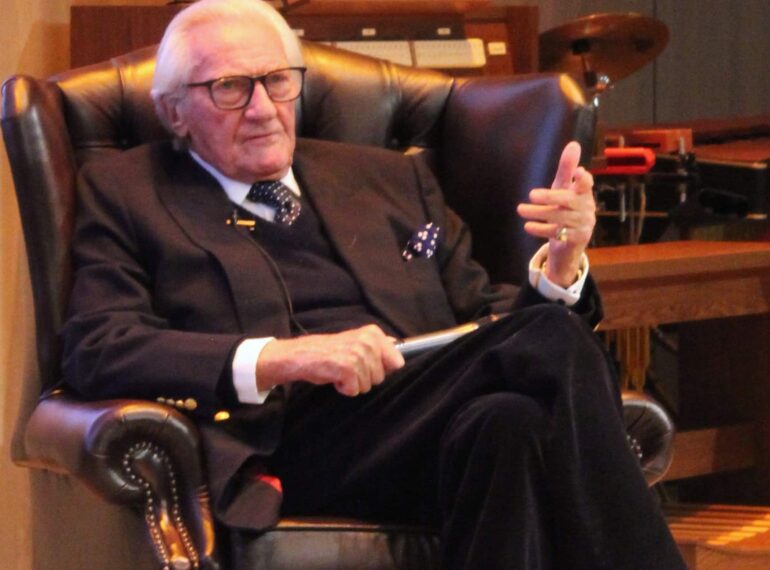
Former Deputy Prime Minister Lord Michael Heseltine delivered a lunchtime lecture giving an insider’s view of the key characters and issues that have shaped modern British politics.
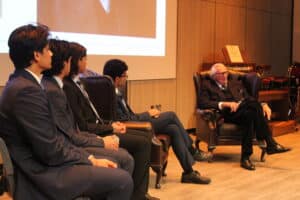 The Conservative politician, who worked directly with four Prime Ministers, spoke to a packed house drawn from all year groups in the Friends’ Recital Hall. The optional lecture, part of QE’s Flourish extra-curricular programme, was organised by Year 13 pupil Anish Kumar and the QE Politics Society.
The Conservative politician, who worked directly with four Prime Ministers, spoke to a packed house drawn from all year groups in the Friends’ Recital Hall. The optional lecture, part of QE’s Flourish extra-curricular programme, was organised by Year 13 pupil Anish Kumar and the QE Politics Society.
Headmaster Neil Enright said: “We are keen for the boys to hear from leaders and influential thinkers in their respective fields. Lord Heseltine is a towering figure in British politics: it was an honour to welcome him to the School and we are most grateful to him for taking the time to visit and deliver such an insightful lecture drawn from a political career spanning some 50 years.”
Mr Enright thanked Anish and the Politics Society for organising the visit and paid tribute to all who had worked to ensure it passed off smoothly.
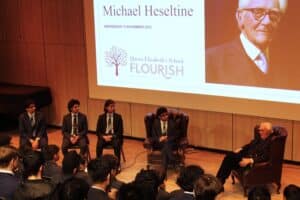 Lord Heseltine, who is 90, began his career as a property developer, before becoming one of the founders of the Haymarket publishing house. He served as a Conservative Member of Parliament from 1966 to 2001, when he was created a life peer.
Lord Heseltine, who is 90, began his career as a property developer, before becoming one of the founders of the Haymarket publishing house. He served as a Conservative Member of Parliament from 1966 to 2001, when he was created a life peer.
Having previously served Ted Heath, he entered the Cabinet in 1979 under Margaret Thatcher as Secretary of State for the Environment. He served as Deputy Prime Minister and First Secretary of State within John Major’s administration. Later, he fulfilled advisory roles when David Cameron was Prime Minister.
Lord Heseltine began his lecture after a welcome from Anish – who introduced him as “one of [his] political heroes” – and warm applause from the boys.
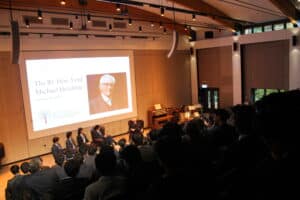 In his lecture, he covered topics ranging from industrial strategy (a particular interest and area of expertise of his) and the revitalisation of the city of Liverpool (with which he has a special, and perhaps unique, relationship as a Conservative politician), to devolution. Famously a supporter of the European Union and opponent of Eurosceptics, he expressed his desire to see the UK return to the EU fold in the future.
In his lecture, he covered topics ranging from industrial strategy (a particular interest and area of expertise of his) and the revitalisation of the city of Liverpool (with which he has a special, and perhaps unique, relationship as a Conservative politician), to devolution. Famously a supporter of the European Union and opponent of Eurosceptics, he expressed his desire to see the UK return to the EU fold in the future.
In a Q & A session chaired by Anish, pupils then posed their own questions.
- On the future of the Conservative Party, he opined that it will find power from the centre-ground – an answer that was especially topical, given the recent Government reshuffle and the return to government of David, now Lord, Cameron;
- On the nature of a life in politics, Lord Heseltine said it was a privilege, but one that inescapably involved making unpopular decisions, often on “50:50” issues in which the side you support will think you reasonable and “a good, sensible bloke”, while those whose expectations are dashed will believe you don’t listen, don’t care and are in politics only for yourself!
- When asked about his proudest moment, he referenced his 1981 party conference speech;
- On whether he regrets not quite becoming Prime Minister, he answered in the affirmative and furthermore set out the approach he would take to transform the nation’s governance and economic strategy if he were in 10 Downing Street today.

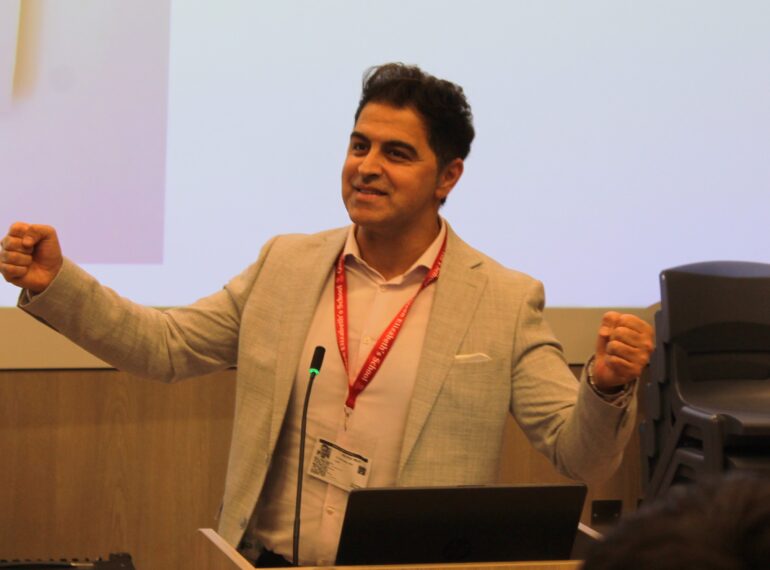
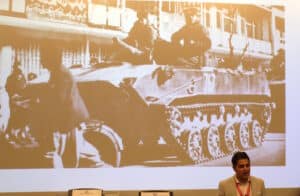 Over the past 24 years, he has studied at Cambridge, Imperial and Harvard, qualified as a doctor, been recognised as a World Health Organisation digital health expert and won numerous awards.
Over the past 24 years, he has studied at Cambridge, Imperial and Harvard, qualified as a doctor, been recognised as a World Health Organisation digital health expert and won numerous awards.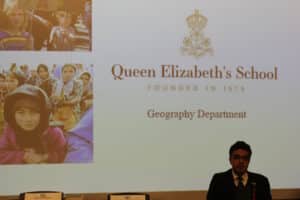 He impressed upon the Year 9s the value of always holding on to hope, even in the toughest of times, explaining how his dream of becoming a doctor fuelled him during his studies, which culminated in him eventually getting a scholarship at Harvard Medical School. He now works as a Accident and Emergency doctor in North West England.
He impressed upon the Year 9s the value of always holding on to hope, even in the toughest of times, explaining how his dream of becoming a doctor fuelled him during his studies, which culminated in him eventually getting a scholarship at Harvard Medical School. He now works as a Accident and Emergency doctor in North West England.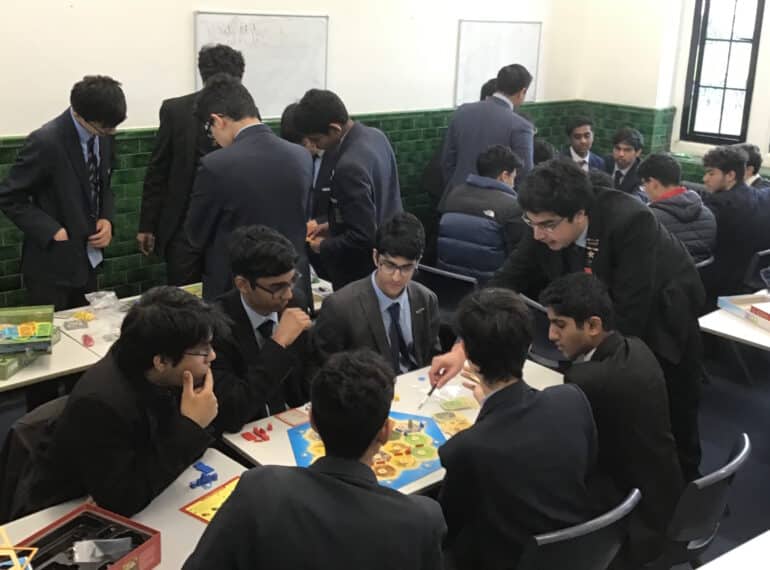
 The festival featured academic tutorials and a lecture from Old Elizabethans, board games, a quiz, a meeting of QE’s Gresham Society for Economics and a special edition of the department’s periodical,
The festival featured academic tutorials and a lecture from Old Elizabethans, board games, a quiz, a meeting of QE’s Gresham Society for Economics and a special edition of the department’s periodical, 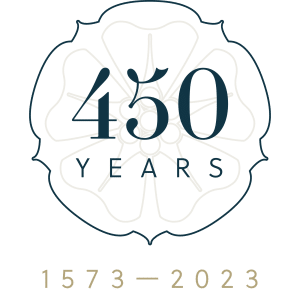 Head of Economics Shamendra Uduwawala said: “Our events had huge turnouts and the festival may be regarded as a great success. I am grateful to everyone who contributed. The boys enjoyed the board games, the quiz and our visiting speakers, while our senior students have once again raised the bar with the festival edition of The Econobethan, which includes some really spectacular work.”
Head of Economics Shamendra Uduwawala said: “Our events had huge turnouts and the festival may be regarded as a great success. I am grateful to everyone who contributed. The boys enjoyed the board games, the quiz and our visiting speakers, while our senior students have once again raised the bar with the festival edition of The Econobethan, which includes some really spectacular work.”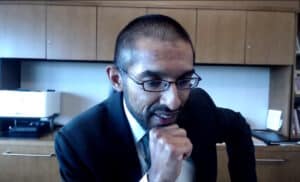 Another highlight was a talk by economist and academic Sandeep Mazumder (OE 1993–2000), who is Dean of Hankamer School of Business at Baylor University, Texas.
Another highlight was a talk by economist and academic Sandeep Mazumder (OE 1993–2000), who is Dean of Hankamer School of Business at Baylor University, Texas.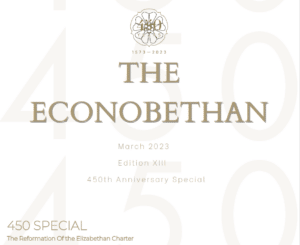 He wrote: “As my predecessor, Dr John Marincowitz (Headmaster 1999-2011), explained at this year’s Senior Awards Ceremony, when discussing his new published history of the School, the fortunes of the School have repeatedly been shaped by the political, economic and social context of the time. He emphasised that much of the interest in the development of Queen Elizabeth’s, and its multiple reinventions over the centuries, can be found in considering not just the ‘what’, but in the ‘how’ and the ‘why’.
He wrote: “As my predecessor, Dr John Marincowitz (Headmaster 1999-2011), explained at this year’s Senior Awards Ceremony, when discussing his new published history of the School, the fortunes of the School have repeatedly been shaped by the political, economic and social context of the time. He emphasised that much of the interest in the development of Queen Elizabeth’s, and its multiple reinventions over the centuries, can be found in considering not just the ‘what’, but in the ‘how’ and the ‘why’.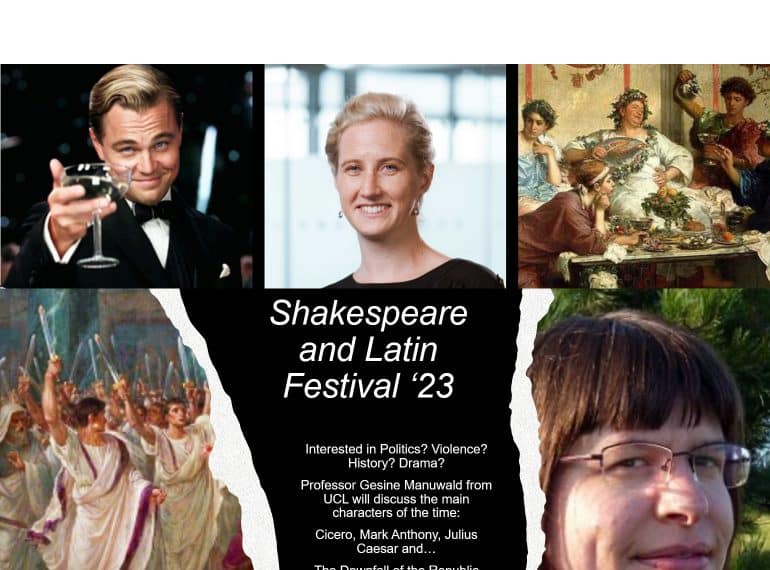
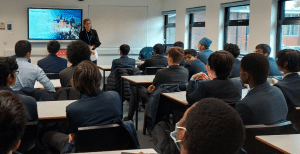 The School re-introduced Latin as a full curriculum subject in 2012, and all boys opting to study more than one language at GCSE are invited to take classes in Ancient Greek. The announcement follows QE’s inaugural Shakespeare and Latin Festival, which got under way towards the end of the Autumn Term.
The School re-introduced Latin as a full curriculum subject in 2012, and all boys opting to study more than one language at GCSE are invited to take classes in Ancient Greek. The announcement follows QE’s inaugural Shakespeare and Latin Festival, which got under way towards the end of the Autumn Term. The announcement of QE’s new role is one of a series of recent announcements from external organisations which have further underlined QE’s academic credentials. Earlier this month, the influential Sunday Times Parent Power survey confirmed that this year’s QE A-level results were the best of any state school in the country. Before that, Schools Minister Nick Gibb wrote to Mr Enright to congratulate the School on its “leadership in continuing to promote the teaching of languages”. All 191 boys in last year’s Year 11 were entered for at least one modern foreign language GCSE – a 100% rate which puts QE “amongst the top schools in England for the proportion of pupils studying a language at GCSE”, Mr Gibb wrote.
The announcement of QE’s new role is one of a series of recent announcements from external organisations which have further underlined QE’s academic credentials. Earlier this month, the influential Sunday Times Parent Power survey confirmed that this year’s QE A-level results were the best of any state school in the country. Before that, Schools Minister Nick Gibb wrote to Mr Enright to congratulate the School on its “leadership in continuing to promote the teaching of languages”. All 191 boys in last year’s Year 11 were entered for at least one modern foreign language GCSE – a 100% rate which puts QE “amongst the top schools in England for the proportion of pupils studying a language at GCSE”, Mr Gibb wrote.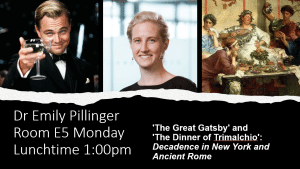 In her lecture delivered at the School, Dr Emily Pillinger, Senior Lecturer in Latin Language and Literature at King’s, looked at Decadence in New York and Ancient Rome. Her well-attended talk was open to senior Latinists and English Literature GCSE and A-level students. “Dr Pillinger drew out the links between Baz Luhrmann’s film of The Great Gatsby, Fitzgerald’s novel and the ancient Latin text, The Feast of Trimalchio,” said Mr Bonham-Carter.
In her lecture delivered at the School, Dr Emily Pillinger, Senior Lecturer in Latin Language and Literature at King’s, looked at Decadence in New York and Ancient Rome. Her well-attended talk was open to senior Latinists and English Literature GCSE and A-level students. “Dr Pillinger drew out the links between Baz Luhrmann’s film of The Great Gatsby, Fitzgerald’s novel and the ancient Latin text, The Feast of Trimalchio,” said Mr Bonham-Carter.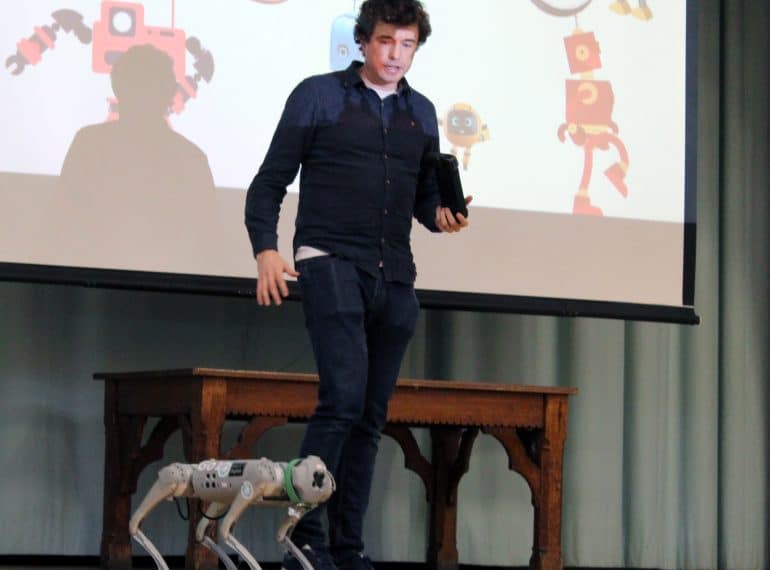
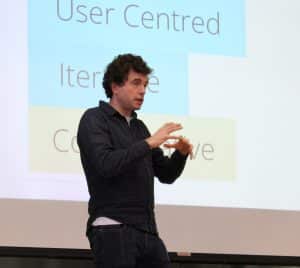 Mr Greig, who works for Deloitte Digital (part of the global Deloitte financial services and consultancy group) as its Chief Disruptor, made it through the snow to give a lunchtime lecture about his work, which involves working with new technologies to understand how they can benefit clients.
Mr Greig, who works for Deloitte Digital (part of the global Deloitte financial services and consultancy group) as its Chief Disruptor, made it through the snow to give a lunchtime lecture about his work, which involves working with new technologies to understand how they can benefit clients.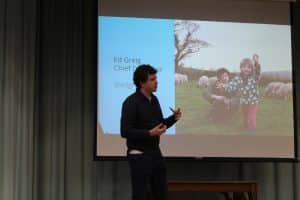 He gave the real-life example of a prosthetic arm for a six-year-old girl, where the issue was not merely the functionality of the limb, but making sure the girl would actually wear it by ensuring its design was fashionable and appealing, so that she would want to put it on.
He gave the real-life example of a prosthetic arm for a six-year-old girl, where the issue was not merely the functionality of the limb, but making sure the girl would actually wear it by ensuring its design was fashionable and appealing, so that she would want to put it on.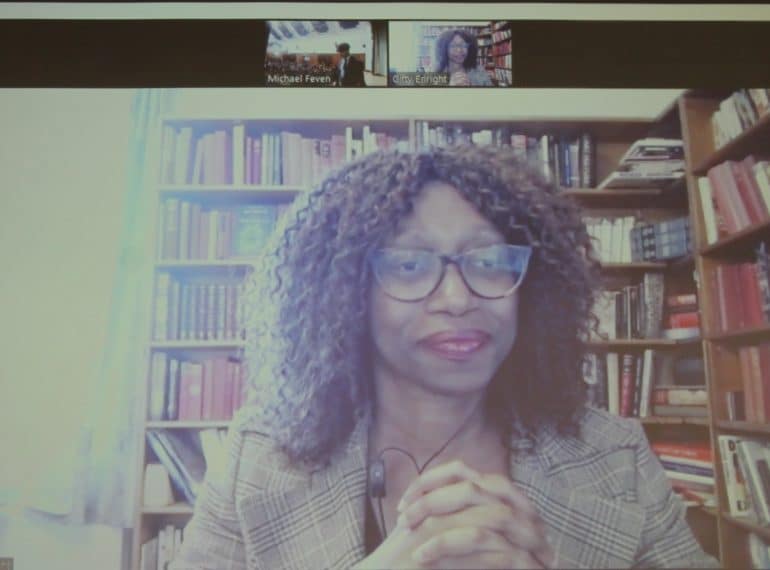
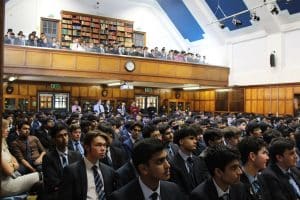 Her virtual talk was one of a number of activities held at the School during the week of International Women’s Day (IWD), which this year had the theme of #BreakTheBias.
Her virtual talk was one of a number of activities held at the School during the week of International Women’s Day (IWD), which this year had the theme of #BreakTheBias.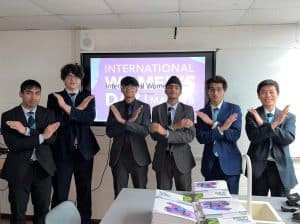 “Her talk and the other activities during the week complement the work we have been doing to encourage boys to adopt the stance of ‘
“Her talk and the other activities during the week complement the work we have been doing to encourage boys to adopt the stance of ‘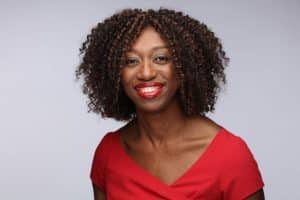 Under the topic of ‘attribution’, for example, she gave this scenario: “A female colleague says something in a meeting and is ignored but a male colleague says the same thing and everyone jumps on the idea.” The challenge she passed on was this: “Remind everyone that the idea originated from the female colleague.”
Under the topic of ‘attribution’, for example, she gave this scenario: “A female colleague says something in a meeting and is ignored but a male colleague says the same thing and everyone jumps on the idea.” The challenge she passed on was this: “Remind everyone that the idea originated from the female colleague.”